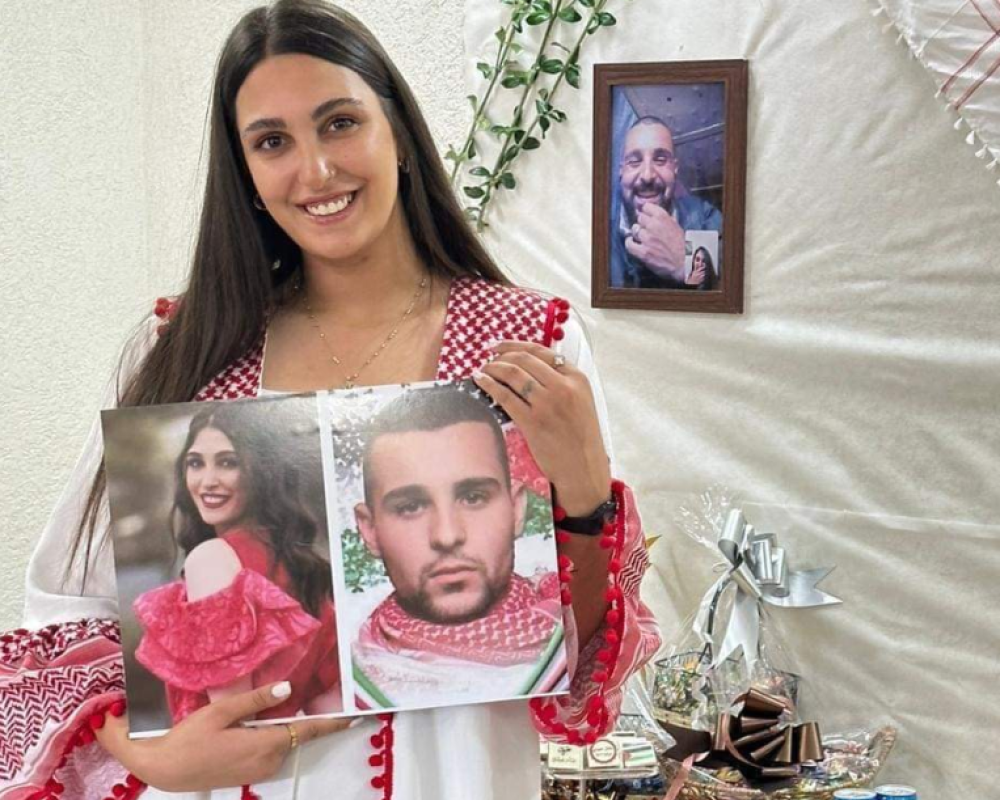
Jerusalem/PNN/Najib Faraj /
After nine years of deprivation, pain, injustice, and torture, the prison doors opened for prisoner Bashar Al-Obaidi from the town of Silwan in occupied Jerusalem. He was welcomed by his family, friends, and loved ones, including his fiancée Islam Aliyan, who resides in the town of Al-Issawiya. This scene reflects the depth of dedication, challenge, and loyalty, or even more, that no matter how long prison years may be, they cannot imprison anyone, nor can they shatter people's dreams and aspirations. In fact, it shows that willpower is undoubtedly triumphant and that injustice cannot endure or eliminate people's dreams.
The Israeli authorities released Bashar, 32 years old, from the Negev Desert Prison and quickly returned him to prison before he could complete his greetings with his future in-laws. As usual, the Israeli authorities imposed various prohibitions on the Jerusalemite prisoners, such as banning celebrations, raising flags, playing music, national songs, or any other national manifestations. However, all these prohibitions quickly fade in the face of people's determination to celebrate the prisoners and praise their steadfastness.
The Love Story:
Returning to the story of the relationship between Bashar and Islam, it began when Islam was visiting her brother, prisoner Mohammad, who was sentenced to 38 months in prison and happened to meet Bashar, who was a friend of her brother behind the barbed wire at the Raymond Desert Prison. They got to know each other during the same visit, which took place six years ago, and the first visit turned into admiration and a love story that culminated in their engagement and subsequent marriage, despite the restrictions. Islam, who graduated from Palestine Ahliya University in Bethlehem with a degree in journalism and media, has been visiting her fiancé since their engagement about two years ago, and the two have been waiting for each other until this day.

About a week ago, it was the couple's last visit behind bars, so Islam, who was eagerly awaiting the moment of her fiancé's release, wore a Palestinian embroidered dress with red threads and brought various sweets, including baklava, distributing them to the families of the prisoners in preparation for the moment of their meeting and to express the joy that emerged in the midst of the darkness of the night and the prison's darkness. She always said that the joy was unique because it was born out of suffering and managed to prevail over the bitter reality created by the occupation's brutality and racist practices. It was a rehearsal for the great joy and celebration that will surely come with the liberation of Palestine, regardless of the length of time it takes.
Among the celebrations for this occasion, Islam organized a symbolic henna party in the presence of her friends, wearing a Palestinian dress and playing national songs, including "I don't want a ring, nor do I desire one. I want the Palestinian flag to flutter in all the courtyards. I don't want a gift, nor do I desire one. I want the Palestinian flag to flutter in the Masqoubiya prison. I don't want gold, nor do I desire it. I want the Palestinian flag to flutter in the Negev prison. I don't want a dress, nor do I desire one. I want the Palestinian flag to flutter in Ashkelon. I don't want a wedding procession, nor do I desire one. I want Palestine to be liberated from the West Bank."
The love story between Bashar and Islam will reach its peak next month when they celebrate their wedding in a grand national ceremony in the city of Arab Jerusalem. It will be a great national occasion that demands the freedom of the prisoners and the freedom of Palestine and its people.
